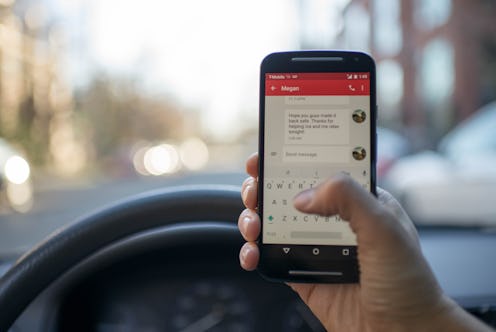
So, OK, we all know that we shouldn't text and drive, right? But most of us do it anyway, and insist it's not a big deal, and insist it's totally fine, and insist that we're good at it. But just a heads up: You're never going to be "good" at it. Like, it's physically impossible, and we have the research to prove it. Because depressing PSAs and laws and driver's ed clearly haven't made much of a difference, even though they probably should have.
In a study conducted in 2015 and recently published in the journal Epilepsy & Behavior , scientists evaluated 129 subjects' response to text messaging using video-EEG monitoring, which tracks brainwaves. (The subjects were mostly present for epilepsy-related reasons.) The research team, led by Dr. William O. Tatum of the Mayo Clinic, found that one in five patients exihibited a unique rhythm associated exclusively with texting. The rhythm wasn't present in any other activities that required speaking, moving, or talking on the phone, and occurred consistently over the course of 16 months. The only other activity or device that sparked a similar brainwave pattern was a tablet, which is essentially a slightly larger smartphone.
You know what brainwaves do? Determine our level of concentration (among many, many other things). You know what texting does to our brainwaves? Interrupts them with a burst of new rhythm. Remember when you insisted you had trained yourself to be good at texting and driving?
Yeah, you didn't.
Scientists have hypothesized several reasons for "texting brain": The screen is a much smaller space on which you need to focus your eyes, so it may spark a burst of hyper-attentiveness. Which... is great, except that when you're driving, that hyper-attentiveness should be focused on the road, not your phone. Additionally, we're at a point culturally where we experience a rush of dopamine when checking our phones. We are Pavlov's dogs, except instead of a ringing bell and drooling, it's that little red notification box and a rush of dopamine. And that's more than a little troubling.
The only way to avoid the abrupt change in brainwaves is to not answer your phone. So don't do it. Science says so, and so does your mom. And especially don't do it when you're behind the wheel of a car.